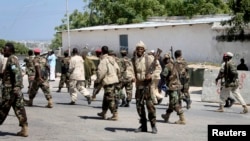NAIROBI, KENYA —
Somali officials say at least two people have been killed and three others wounded after a bomber blew himself up outside the Somali prime minister’s office. The attack comes at a time the capital is enjoying relative peace and thousands of Somalis are returning home.
The attack Tuesday at the Villa Somalia complex in central Mogadishu was the first suicide bombing in the city this year.
The bomber set off the blast near a group of soldiers killing two people and wounding others. The president was out of the country and the prime minister is reported to be safe.
A press statement from the prime minister’s office, read by Information Minister Abdulah el Mogeh Hirsi, says Tuesday’s attack wasn’t only a attack against the government but also against its citizens.
The prime minister, in the statement, condemned the attack of the terrorist who he said tried to come to the presidential compound so that he could terrorize the government, security forces and its people. The statement says anyone who tries to attack the government not only attacks the government but all humanity.
According to some of the guards of the prime minister, the attacker was an al-Shabab defector.
There was no immediate claim of responsibility for the blast, but the al-Qaida-linked group has claimed responsibility for some isolated attacks in the capital, including a suicide bombing in September outside a hotel where the president, Hassan Sheikh Mohamud, was meeting delegates from Kenya.
African Union and Somali forces drove al-Shabab militants from the city 18 months ago. In September of last year, attacks from the sea, air and ground by Kenyan troops forced the militants to withdraw from their last major stronghold and financial hub, the port city of Kismayo.
Hirsi said al-Shabab is trying to undermine the six-month-old Somali government.
Hirsi said people like Tuesday's attacker are people who are not happy with the progress the new Somali government has made. He says we all know the end of al-Shabab is near and he says all of the international community is united to fight them not only here in Somalia but everywhere they are, like Mali.
Al-Shabab's power has waned but the group is still considered a threat. Earlier this month, the group executed a French hostage, Denis Allex, and has warned it will kill a group of Kenyan hostages unless Kenya releases Muslims arrested on charges of terrorism.
The attack Tuesday at the Villa Somalia complex in central Mogadishu was the first suicide bombing in the city this year.
The bomber set off the blast near a group of soldiers killing two people and wounding others. The president was out of the country and the prime minister is reported to be safe.
A press statement from the prime minister’s office, read by Information Minister Abdulah el Mogeh Hirsi, says Tuesday’s attack wasn’t only a attack against the government but also against its citizens.
The prime minister, in the statement, condemned the attack of the terrorist who he said tried to come to the presidential compound so that he could terrorize the government, security forces and its people. The statement says anyone who tries to attack the government not only attacks the government but all humanity.
According to some of the guards of the prime minister, the attacker was an al-Shabab defector.
There was no immediate claim of responsibility for the blast, but the al-Qaida-linked group has claimed responsibility for some isolated attacks in the capital, including a suicide bombing in September outside a hotel where the president, Hassan Sheikh Mohamud, was meeting delegates from Kenya.
African Union and Somali forces drove al-Shabab militants from the city 18 months ago. In September of last year, attacks from the sea, air and ground by Kenyan troops forced the militants to withdraw from their last major stronghold and financial hub, the port city of Kismayo.
Hirsi said al-Shabab is trying to undermine the six-month-old Somali government.
Hirsi said people like Tuesday's attacker are people who are not happy with the progress the new Somali government has made. He says we all know the end of al-Shabab is near and he says all of the international community is united to fight them not only here in Somalia but everywhere they are, like Mali.
Al-Shabab's power has waned but the group is still considered a threat. Earlier this month, the group executed a French hostage, Denis Allex, and has warned it will kill a group of Kenyan hostages unless Kenya releases Muslims arrested on charges of terrorism.




